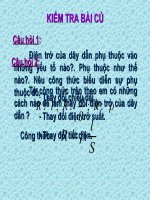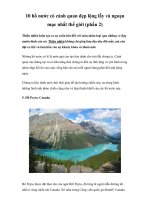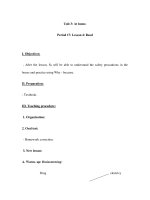period 10 period 10 so¹n gi¶ng unit2 making arrangements lesson 4 read aims by the end of the lesson sts will be able to know more about alexander graham sell preparation teacher poster picture
Bạn đang xem bản rút gọn của tài liệu. Xem và tải ngay bản đầy đủ của tài liệu tại đây (50.42 KB, 3 trang )
<span class='text_page_counter'>(1)</span><div class='page_container' data-page=1>
<b>Period 10:</b> <i><sub>Soạn</sub></i>
<i>Giảng</i>
<b>Unit2: </b>
<b>Making arrangements</b>
<b>Lesson 4:</b>
<b>Read</b>
<b>*) Aims:</b>
By the end of the lesson, sts will be able to know more about
Alexander Graham sell.
<b>* Preparation:</b>
- Teacher: poster, pictures of sell
- Sts: Text book, learn the old lessons
<b>I. Organization</b>
8A:
8B:
8C:
<b>II. Revision :</b>
<b>1. Checking homewrok:</b>
? What is used to send fax?/make phone calls any where we like?/find
someone's telephone number?
Answer key:
a fax machine/a mobile phone/ atelephone directory
<b>2. Warm - up:</b>
to get entertainement to chat
to make arrangements to by
goods
to get information
? Do you know who invented the telephone? (Alexander Graham Bell)
-> To day we'll read a text about him and his invention.
<b>III. New lesson:</b>
<b>1. Pre - Reading</b>
* Pre teach Vocab
=> checking: Rub out and
<b>I. Vocab</b>
- (to) emigrate: xuÊt c¶nh, di c
(example: go to another country to live)
- (to) transmit: trun, ph¸t (translation)
- device (n): thiết bị, dụng cụ
- (to) conduct: thực hiện, tiến hành
- a deaf - mute: ngêi võa câm vừa điếc
(explanation: a person who is unable to hear
and speak)
- (to) demonstrate: chøng minh, biÓu diƠn
- exhibition (n): cc triĨn l·m, trng bµy
- countless (Adj): v« sè, v« kĨ
</div>
<span class='text_page_counter'>(2)</span><div class='page_container' data-page=2>
remember.
(+) Set the scene: Look at Pix
P21. This is Alexander
Graham Bell. He invented the
telephone
(+) These statements are
about
Alexander Graham Bell and
his invention. Some of them
are true and some of them are
fales.
? Predict if they are true or
false?
(Sts check the boxes given)
<b>2. While reading</b>
? Read the text on page 21,
22 to check your prediction?
? Correct the false statements,
please?
(pairwork)
? Look at Ex2 P22. Read the
events of Bell's life and put
them in the correct order?
(Individually -> compare with
partners)
<b>III. Reading</b>
1. T/F statements prediction:
(Exercise 1 P22)
T F
Eg: Alexander Graham Bell was born
in the USA
Gruess Answers Correction
a F F He was born in Edingburgh in
b F He worked with deaf - mutes<sub>at Boston University</sub>
c T He introduced the telephone<sub>in 1876</sub>
d F He experimented with ways<sub>of </sub>
e F transmittng speech over
f T a long distance
<b>III. Ordering (Exercise 2 P22)</b>
Answer key:
Alexander Graham Bell...
1 - d: Was born in Scotland
2 - e: Went to live in Canada
3 - a: Went to live in the United states
4 - g: Worked with people who could neither
speak nor hear.
5 - c: Worked with Thomas Watson
6 - b: Successfully demonstrated his invention
7 - f: invented the telephone
<b>IV. Writing - it - up</b>
? Write a paragraph about Bell's life using
the information from the text?
Eg: Alexander Graham Bell was born on
March 3nd<sub>, 1847 in Scotland. He went to live</sub>
</div>
<span class='text_page_counter'>(3)</span><div class='page_container' data-page=3>
<b>IV. Consolifation:</b>
? What is the text about? (Sts: Alexander Graham Bell and his
invention of telephone)
<b>V. Home work</b>
- Write the paragraph (you have just written and corrected with
friends) into your notebooks.
- Exercise reading (page 18)
<i><b>Evaluation:</b></i>
.
</div>
<!--links-->









